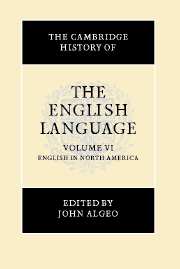Book contents
- Frontmatter
- 1 EXTERNAL HISTORY
- 2 BRITISH AND AMERICAN, CONTINUITY AND DIVERGENCE
- 3 BRITISH AND IRISH ANTECEDENTS
- 4 CONTACT WITH OTHER LANGUAGES
- 5 AMERICANISMS
- 6 SLANG
- 7 DIALECTS
- 8 AFRICAN-AMERICAN ENGLISH
- 9 GRAMMATICAL STRUCTURE
- 10 SPELLING
- 11 USAGE
- 12 CANADIAN ENGLISH
- 13 NEWFOUNDLAND ENGLISH
- 14 American English Abroad
- Glossary of Linguistic Terms
- Bibliography
- Index
- THE CAMBRIDGE HISTORY OF THE ENGLISH LANGUAGE
1 - EXTERNAL HISTORY
Published online by Cambridge University Press: 28 March 2008
- Frontmatter
- 1 EXTERNAL HISTORY
- 2 BRITISH AND AMERICAN, CONTINUITY AND DIVERGENCE
- 3 BRITISH AND IRISH ANTECEDENTS
- 4 CONTACT WITH OTHER LANGUAGES
- 5 AMERICANISMS
- 6 SLANG
- 7 DIALECTS
- 8 AFRICAN-AMERICAN ENGLISH
- 9 GRAMMATICAL STRUCTURE
- 10 SPELLING
- 11 USAGE
- 12 CANADIAN ENGLISH
- 13 NEWFOUNDLAND ENGLISH
- 14 American English Abroad
- Glossary of Linguistic Terms
- Bibliography
- Index
- THE CAMBRIDGE HISTORY OF THE ENGLISH LANGUAGE
Summary
History, external and internal
The history of a language is intimately related to the history of the community of its speakers, so neither can be studied without considering the other.
The external history of a language is the history of its speakers as their history affects the language they use. It includes such factors as the topography of the land where they live, their migrations, their wars, their conquests of and by others, their government, their arts and sciences, their economics and technology, their religions and philosophies, their trade and commerce, their marriage customs and family patterns, their architecture, their sports and recreations, and indeed every aspect of their lives. Language is so basic to human activity that there is nothing human beings do that does not influence and, in turn, is not influenced by the language they speak. Indeed, if Benjamin Lee Whorf (1956) was right, our very thought patterns and view of the world are inescapably connected with our language.
It is, of course, possible to view the history of a language merely as internal history – a series of changes in the inventory of linguistic units (vocabulary) and the system by which they are related (grammar), quite apart from any experiences undergone by the users of the language. We can describe how the vocabulary is affected by loanwords or how new words are derived from the language's own lexical resources. We can formulate sound laws and shifts, describe changes that convert an inflected language to an isolating one, or a syntax that puts an object before its verb to one that puts the verb before its object.
- Type
- Chapter
- Information
- The Cambridge History of the English Language , pp. 1 - 58Publisher: Cambridge University PressPrint publication year: 2001
- 29
- Cited by

